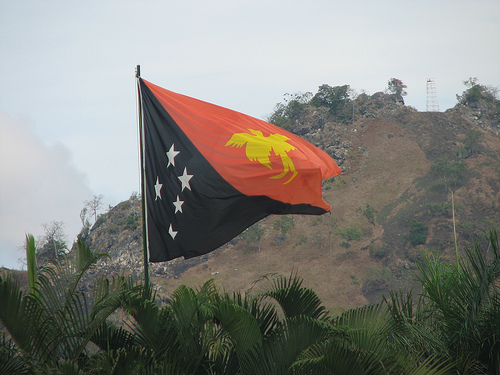
Papua New Guinea (PNG) can be a little confusing. Although it shares half of the island of New Guinea with Papua – an Indonesian province – Papua New Guinea is distinctly different from its neighbor. Indeed PNG seems to exist in a world of its own – one plagued by political mismanagement, human rights abuses, corruption, and low levels of development.
Contrary to the outbursts of unrest in the Middle East, however, the peoples of PNG are highly unlikely to lead protests or a revolt against their government. PNG is a country of incredible linguistic and cultural diversity – though perhaps surprisingly, not in terms of religion (96 percent are Christian). It is also a relatively “young” country, having only gained independence in 1975. The current Prime Minister, Sir Michael Somare, has been in and out of power in PNG since 1972, and like certain other political heads of state, seems not to want to relinquish his position. Just over a month ago, the government successfully evaded another vote of no confidence by using its majority to adjourn parliament until May. Deputy opposition leader Bart Philemon notes that by the next election, there will have been 10 years of (relative) political stability – but hardly any improvement in the standard of living for the majority of the population.
Human Rights Watch recently released a report on PNG’s Porgera gold mine, run by Canadian corporation Barrick Gold. The mine has produced more than sixteen million ounces of gold since 1990, accounting for roughly 12 percent of PNG’s total exports in 2009. Unfortunately, this wealth does not seem to have ‘trickled down’ to the local population – they have instead been subject to sexual abuse, violence and 15,000 tons of chemical waste polluting their water supply every day. PNG places 137th on the UN’s 2010 Human Development Index – eight places above Haiti, eighteen above Afghanistan.
In addition, PNG has been experiencing outbreaks of cholera since August 2009, in part due to the government’s inability “to meet and overcome the challenge posed by the country’s geography”, Laurence Chandy states, “environmental determinism has effectively won over.” Seventeen months after the first cases were recorded, over 10,000 people have now been diagnosed with cholera.
Rather than commit available funds to tackle this public health emergency – a one million dollar cheque prepared by the government bounced – the PNG government decided to be more creative with its money. In response to the devastating floods which hit Queensland in late December 2010 and early January 2011, PNG pledged AUS $4 million in flood relief. Acting Prime Minister Sam Abal said the donation “was the least PNG could do for a neighbor and close friend”. It also recently emerged that the PNG National Rugby League Bid Team, a government-backed project aimed at ensuring PNG’s entry into the highly competitive Australian National Rugby League in 2015, has entered into a sponsorship deal with a high-profile team from Brisbane. AusAid provides AUS $4 million in funding for the rugby league in PNG; the sponsorship deal alone is worth A$250,000 a season. The government’s priorities oddly don’t seem to be with the welfare of its own people, but more with getting a logo on pairs of rugby shorts.
Whilst the threat of election violence come 2012 is very real – the national police force have already started planning how to best contain possible security issues – it is unlikely to be of a revolutionary nature. Rather, as a 2001 article by Benjamin Reilly claims, the incredible ethno-linguistic fragmentation to be found in the country actually consolidates democracy, as no one group is able to monopolize political power. Violence is instead local and clan-based. The devolution of power to the provincial level – whilst not curbing financial mismanagement and corruption – also helps stabilize the situation. (The full paper is available here; subscription access only).
Revolution is only one – albeit very dramatic – way of political protest. It requires political will, coordination, and communication on the part of those demanding change. In PNG, it is not unusual for clans or villages to be completely unaware of neighboring groups, living just a few kilometers away. PNG’s political culture needs to change – and its people receive the benefits of the country’s gold, copper and oil resources. It will be a long time coming, but then hopefully it will not be what in Pidgin is known as “Aiyu naipanya kaiti katenge”: thunder that brings no rain.

